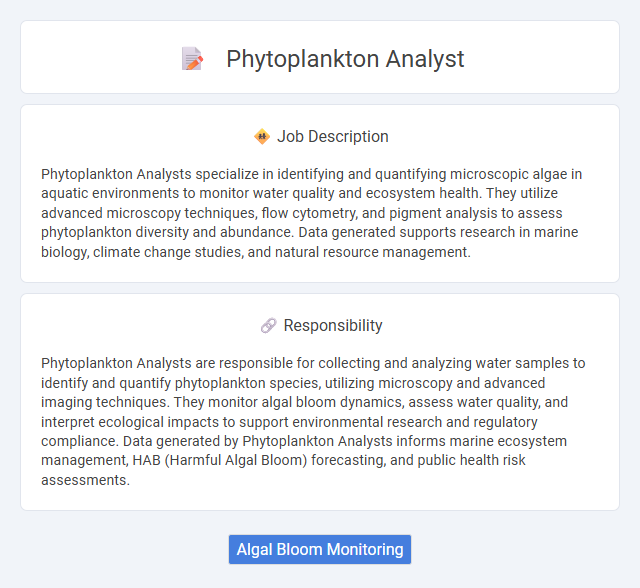
Phytoplankton Analysts specialize in identifying and quantifying microscopic algae in aquatic environments to monitor water quality and ecosystem health. They utilize advanced microscopy techniques, flow cytometry, and pigment analysis to assess phytoplankton diversity and abundance. Data generated supports research in marine biology, climate change studies, and natural resource management.
Individuals with strong analytical skills and a passion for marine biology are likely to find a Phytoplankton Analyst role suitable. Those comfortable working with microscopes, data analysis software, and field sampling might adapt well to the job's technical and detail-oriented demands. Candidates who prefer collaborative environments and have an interest in environmental monitoring may have a higher probability of thriving in this position.
Qualification
A Phytoplankton Analyst must possess a strong background in marine biology, oceanography, or environmental science, typically requiring a Bachelor's or Master's degree in these fields. Proficiency in microscopic identification techniques and experience with flow cytometry or molecular methods for analyzing phytoplankton species diversity and abundance are essential. Skills in data analysis, familiarity with software like R or MATLAB, and knowledge of water quality parameters enhance the ability to assess ecosystem health and support research projects effectively.
Responsibility
Phytoplankton Analysts are responsible for collecting and analyzing water samples to identify and quantify phytoplankton species, utilizing microscopy and advanced imaging techniques. They monitor algal bloom dynamics, assess water quality, and interpret ecological impacts to support environmental research and regulatory compliance. Data generated by Phytoplankton Analysts informs marine ecosystem management, HAB (Harmful Algal Bloom) forecasting, and public health risk assessments.
Benefit
Phytoplankton Analyst roles likely offer significant benefits including opportunities to contribute to environmental monitoring and marine ecosystem health. Professionals in this field probably gain specialized skills in microscopy and data analysis, enhancing their expertise in biological and chemical oceanography. These positions may also provide a dynamic work environment with potential fieldwork and collaboration across scientific disciplines.
Challenge
Phytoplankton analyst positions likely involve the challenge of accurately identifying and quantifying diverse phytoplankton species within complex aquatic samples. The role probably demands proficiency in microscopy and data analysis to interpret ecological impacts on marine environments. Managing variability in sample quality and environmental conditions may also pose significant difficulties in ensuring consistent and reliable results.
Career Advancement
Phytoplankton Analysts gain expertise in marine biology, environmental monitoring, and data analysis, increasing their value in ecological research and environmental consultancy sectors. Advancing in this career often involves specializing in algal taxonomy, biotechnological applications, or evolving into roles such as environmental scientists or marine biologists with leadership responsibilities. Proficiency in advanced microscopy and remote sensing technology significantly enhances promotion prospects and opportunities in governmental and private research institutions.
Key Terms
Algal Bloom Monitoring
Phytoplankton Analysts specializing in Algal Bloom Monitoring use advanced microscopy and remote sensing technologies to identify and quantify harmful algal species in aquatic environments. Their expertise in data analysis and environmental chemistry supports early detection and mitigation strategies critical for managing water quality and protecting marine ecosystems. Proficiency in geographic information systems (GIS) and regulatory compliance ensures accurate reporting for environmental agencies and stakeholders.
 kuljobs.com
kuljobs.com